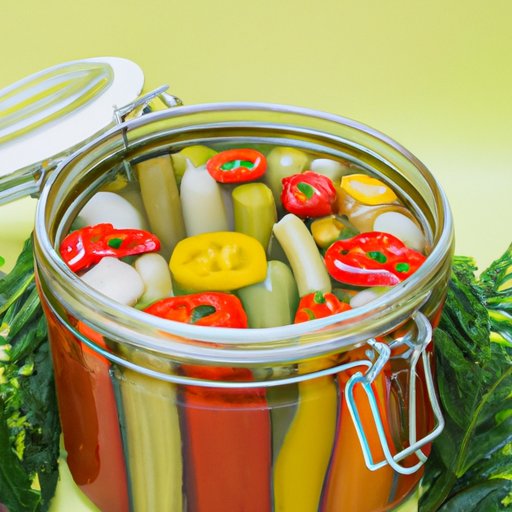Introduction
Canned vegetables are a convenient and affordable way to increase your intake of essential vitamins and minerals. While they can be an important part of a healthy diet, it is important to understand the nutrition facts and potential risks of consuming canned vegetables. This article explores the nutritional content, health benefits, and environmental impact of canned vegetables, as well as the differences between canned and fresh vegetables.

Examining the Nutritional Benefits of Eating Can Vegetables
Canned vegetables are packed with essential vitamins, minerals, and fiber. They also contain antioxidants that can help protect against chronic diseases such as heart disease and cancer. The nutrient content of canned vegetables varies depending on the type of vegetable, but in general, they are a good source of vitamin A, vitamin C, potassium, and fiber.
The health benefits of eating canned vegetables are numerous. Eating a variety of vegetables has been linked to a reduced risk of certain types of cancers, including colorectal cancer. It also helps to maintain a healthy weight, reduce blood pressure, and improve overall heart health. Additionally, canned vegetables are often cheaper than their fresh counterparts, making them a more budget-friendly option for people who want to eat healthier.
The Pros and Cons of Eating Canned Vegetables
There are both advantages and disadvantages to eating canned vegetables. On the plus side, they are a quick and easy way to add more vegetables to your diet. They are also usually less expensive than their fresh counterparts, and they are often available year-round. Furthermore, canned vegetables are usually pre-prepared, which makes them much easier to cook with.
On the downside, canned vegetables may contain added salt and sugar, which can be unhealthy if consumed in excess. Additionally, some canned vegetables may contain high levels of sodium, which can increase your risk of high blood pressure. Finally, canned vegetables may have lower levels of some nutrients than their fresh counterparts.
How to Create a Balanced Diet with Canned Vegetables
Creating a balanced diet with canned vegetables is possible by adding variety to your meals. Try experimenting with different types of canned vegetables and adding them to dishes such as soups, stews, casseroles, and stir-fries. Additionally, you can incorporate canned vegetables into salads and sandwiches for a nutritious and convenient meal.
To increase the nutritional value of canned vegetables, look for types that are labeled “low sodium” or “no added salt”. Additionally, try to choose vegetables that are canned in water or low-sodium broth. Be sure to rinse off any canned vegetables before cooking or eating them to reduce the amount of sodium.

A Guide to Selecting Healthy Canned Vegetables
When selecting canned vegetables, it is important to check the labels for added ingredients such as salt, sugar, or preservatives. Look for varieties that are labeled “low sodium” or “no added salt”, and avoid those with added sugar. Additionally, be sure to check the expiration date to ensure that the product is still safe to consume.
It is also important to pay attention to the sodium content of canned vegetables. The American Heart Association recommends limiting sodium intake to 2,300 milligrams per day, so look for products with no more than 140 milligrams of sodium per serving. If you are trying to reduce your sodium intake, opt for canned vegetables labeled “no salt added” or “unsalted”.

Exploring the Environmental Impact of Canned Vegetables
Canned vegetables can have a negative environmental impact. The processing of canned vegetables requires energy and water, which can lead to increased emissions of greenhouse gases. Additionally, canned vegetables often come in single-use packaging, which can contribute to food waste. To reduce the environmental impact of canned vegetables, opt for those packaged in recyclable materials and try to buy only what you need.
Comparing Fresh and Canned Vegetables: What’s the Difference?
Fresh and canned vegetables differ in terms of their nutrient content and taste. Fresh vegetables tend to have higher levels of vitamins and minerals, while canned vegetables may have lower levels due to processing. Additionally, fresh vegetables tend to have a better texture and flavor than canned vegetables.
It is important to note that both fresh and canned vegetables can be part of a healthy diet. When choosing between the two, consider your individual nutritional needs and preferences. For example, if you are looking for a quick and easy way to get your daily servings of vegetables, canned vegetables may be a better choice.
Conclusion
Canned vegetables can be an important part of a healthy diet. They are a convenient and affordable way to increase your intake of essential vitamins and minerals. However, it is important to understand the potential risks of consuming canned vegetables, such as added salt and sugar, as well as the environmental impact of processing and packaging.
To create a balanced diet with canned vegetables, it is important to add variety to your meals and select products with no added salt or sugar. Additionally, when comparing fresh and canned vegetables, consider your individual nutritional needs and preferences. With proper selection and preparation, canned vegetables can be a nutritious and delicious addition to your diet.
(Note: Is this article not meeting your expectations? Do you have knowledge or insights to share? Unlock new opportunities and expand your reach by joining our authors team. Click Registration to join us and share your expertise with our readers.)
